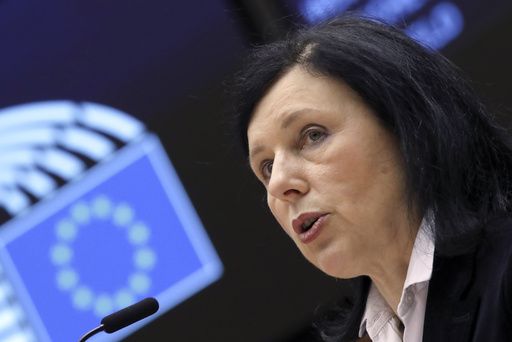Is it real or made by AI? Europe wants a label for that as it fights disinformation
FILE – European Commissioner for Values and Transparency Vera Jourova addresses the plenary at the European Parliament in Brussels, Thursday, March 25, 2021. The European Union is pushing online platforms like Google and Meta to step up the fight against false information by adding labels to text, photos and other content generated by artificial intelligence, EU Commission Vice President Vera Jourova said Monday. (Yves Herman, Pool via AP, File)
LONDON (AP) — The European Union is pushing online platforms like Google and Meta to step up the fight against false information by adding labels to text, photos and other content generated by artificial intelligence, a top official said Monday.
EU Commission Vice President Vera Jourova said the ability of a new generation of AI chatbots to create complex content and visuals in seconds raises “fresh challenges for the fight against disinformation.”
Jourova said she asked Google, Meta, Microsoft, TikTok and other tech companies that have signed up to the 27-nation bloc’s voluntary agreement on combating disinformation to dedicate efforts to tackling the AI problem.
Online platforms that have integrated generative AI into their services, such as Microsoft’s Bing search engine and Google’s Bard chatbot, should build safeguards to prevent “malicious actors” from generating disinformation, Jourova said at a briefing in Brussels.
Companies offering services that have the potential to spread AI-generated disinformation should roll out technology to “recognize such content and clearly label this to users,” she said.
Jourova said EU regulations are aimed at protecting free speech, but when it comes to AI, “I don’t see any right for the machines to have the freedom of speech.”
The swift rise of generative AI technology, which has the capability to produce human-like text, images and video, has amazed many and alarmed others with its potential to transform many aspects of daily life. Europe has taken a lead role in the global movement to regulate artificial intelligence with its AI Act, but the legislation still needs final approval and won’t take effect for several years.
Officials in the EU, which is bringing in a separate set of rules this year to safeguard people from harmful online content, are worried that they need to act faster to keep up with the rapid development of generative artificial intelligence.
The voluntary commitments in the disinformation code will soon become legal obligations under the EU’s Digital Services Act, which will force the biggest tech companies by the end of August to better police their platforms to protect users from hate speech, disinformation and other harmful material.
Jourova said, however, that those companies should start labeling AI-generated content immediately.
Most of those digital giants are already signed up to the EU code, which requires companies to measure their work on combating disinformation and issue regular reports on their progress.
Twitter dropped out last month in what appeared to be the latest move by Elon Musk to loosen restrictions at the social media company after he bought it last year.
The exit drew a stern rebuke, with Jourova calling it a mistake.
“Twitter has chosen the hard way. They chose confrontation,” she said. “Make no mistake, by leaving the code, Twitter has attracted a lot of attention and its actions and compliance with EU law will be scrutinized vigorously and urgently.”


